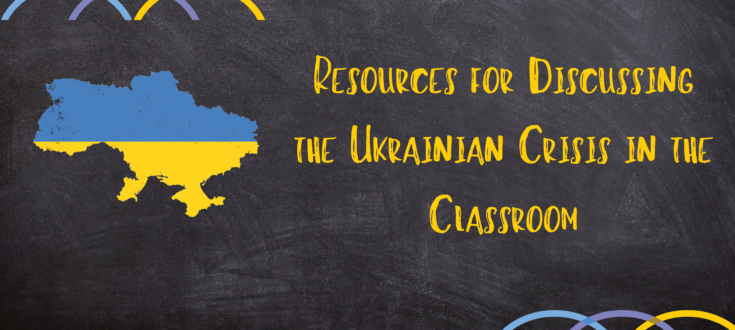Four Considerations for Discussing the Crisis in Ukraine in the Classroom

Please note that the views expressed by organizations and resources mentioned in this article may not reflect those of the World Affairs Council of Cincinnati and Northern Kentucky.
Like many of you, we at the World Affairs Council of Cincinnati and Northern Kentucky have been overwhelmed by the developments in the Russian invasion of Ukraine. Our thoughts are with those who are impacted by the crisis, particularly Ukrainians in our sister city of Kharkiv. While it can be overwhelming to know where to begin with understanding the evolving situation and discussing this conflict with others, we at the Council believe that engagement with current issues is a cornerstone to a globally literate society. American students are eager to know more about this situation and find meaningful ways to help and teachers can play an important role in educating students about this issue. As Richard Haass, President of the Council on Foreign Relations, noted, “The crisis is a great opportunity for teachers to do a few things. One is to explain: ‘Something that’s happening across the world in Europe, why does this matter to some young person in the United States, or to the United States?’ In order to be an informed citizen, one needs to be globally literate. One needs to understand why the world matters, how it works, how foreign policy affects the world.” To assist you with this critical endeavor, we would like to share a few things to consider as well as resources that you can use when working with students.
-
Allow students to “think globally and act locally.”
It can be easy for American students to feel removed from the geopolitical considerations of Ukraine, a country that rarely makes its way into the U.S. curriculum in meaningful ways. At the same time, social media and the internet can make the world feel smaller and accessible. As discussed in our storytelling and communication professional development session last month, personal stories of real-world impact allow for greater student engagement. Here in Greater Cincinnati, our Cincinnati Sister City Association with Kharkiv, Ukraine as well as past visitors from our Council’s International Visitor Leadership Program (IVLP) allows us to form a deeper connection with Ukrainians. On Monday, a group gathered on Fountain Square to March for Ukraine and show solidarity for the people affected by this crisis. Be on the lookout for these local connections and events to share with your students how local politicians and organizations address global issues.
-
Teach students to tackle misinformation.
Russian cyber criminals have long been a threat to democracy. While we are seeing a rise in potential hacker activity, it is important to remind students to keep themselves safe and secure online by implementing password security and avoiding clicking on suspicious links. Aside from cyber attacks, misinformation is another weapon in this crisis. The Department of State and various news outlets have identified several attempts of Russian information confrontation in Ukraine. With new forms of social media allowing video to be shared (and altered) in real time, students should pause to think about the source of the information before they share something online. The News Literacy Project is an excellent organization that helps teachers stop the spread of misinformation and create safer online communities for their students. They have a wealth of resources available for free on their website. We particularly like this ready-to-use lesson plan on Russian disinformation tactics. It is important for teachers to model the process of vetting sources and information for their students, especially with news stories like those we are seeing from this situation. As Common Sense Media notes, students may already know some things about this crisis from their connections online but they might not be exposed to the whole picture and teachers should “accept their sources but expand their horizons.”
-
Implement current events into the existing curriculum in meaningful ways.
Although we mentioned that Ukraine does not always get much coverage in the typical American World History class, now is a great time to expand student horizons and connect current events to existing content themes. In social studies, many state standards and academic approaches have moved to a more inquiry-based or thematic approach which allows teachers to change up the examples they use in their curriculum while staying on track with existing learning targets. This situation allows for many connections into larger discussions on war, imperialism, foreign policy, and economics. Plus, now might be a great time to evaluate why your existing curriculum might not mention lesser-known countries or topics post-Vietnam War. Below are a few possible content angles and resources that you can use in your classroom.
- History of Ukraine/Fall of the Soviet Union
- Choices Program: Teaching News Lesson– Ukraine
- In this curriculum set from Brown University’s Choices Program, students examine the current crisis through the historical context of the fall of the Soviet Union.
- Lesson of the Day: ‘How the Ukraine Crisis Developed, and Where It Might Be Headed’ – The New York Times and How Much Do You Know About Ukraine?
- This lesson uses a New York Times article as a focal point for a larger discussion on historical factors that contributed to this crisis.
- Choices Program: Teaching News Lesson– Ukraine
- Economics
- How much will Biden’s additional sanctions affect Russia? – Marketplace
- Marketplace has a variety of articles, audio clips, and podcasts discussing economic news that might be of interest to students studying business or economics. Russia getting cut off from the SWIFT system might also be an interesting way to discuss financial “plumbing systems” such as ACH and international wires. Discussions of economic sanctions also allow students to see just how interconnected the world is today and what some of the diplomatic options to ending this crisis might be.
- How much will Biden’s additional sanctions affect Russia? – Marketplace
- Social-Emotional Learning (SEL)
- How to Talk to Kids About Violence, Crime, and War | Common Sense Media
- EdWeek: How to Talk With Students About the Russia-Ukraine War
- How to Talk to Kids About the Ukraine Invasion | PBS SoCal
- These resources provide helpful information on keeping student wellbeing in mind when discussing difficult topics.
-
Promote student agency and share ways to help.
Global conflicts can often leave us feeling powerless. In times like these, we should do as Fred Rogers said and “look for the helpers.” There are many organizations in the Greater Cincinnati area that are assisting with cash donations and sending needed supplies to the region, such as Matthew 25 Ministries. Students can also research international aid organizations such as the Red Cross and UNICEF to fundraise around a particular cause as cash tends to go further in situations like these. Bill Hilt, social studies teacher and president of our partner council in Northwest Ohio, is also working on a fundraiser where proceeds of orders of a “Free Ukraine” t-shirt will go to provide Ukrainian teachers and students with resources to promote social and emotional learning (SEL) and student wellbeing during this time. You can order a shirt and have it shipped to your home by visiting their fundraising page. We will continue to update our community of happenings and fundraisers as we receive them, so be sure that you’re subscribed to emails from the World Affairs Council of Cincinnati and Northern Kentucky by registering here.
Students may also want to just share their thoughts and what they are feeling. This New York Times resource provides a forum for students to share and communicate their ideas. Creating safe spaces for discussion within your classroom can also be impactful.
Educators, we appreciate the work that you do to teach difficult yet crucial topics to your students. We are happy to be partners with you in promoting this global work. To learn more and view resources from the Council, please visit GlobalCincinnati.org.


